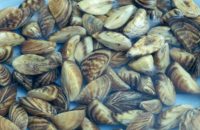
The state is warning that moss balls, which are used in home aquariums, purchased since Feb. 1 are possibly contaminated with an invasive and potentially destructive fresh water species called zebra mussels.
North Carolina’s Department of Environmental Quality, Wildlife Resource Commission and Department of Agriculture & Consumer Services are collaborating to protect water quality and resources from these invasive species, the state announced Tuesday.
Supporter Spotlight
The commission confirmed moss balls contaminated with live zebra mussels were sold at pet stores across North Carolina. Juvenile mussels are small and extremely difficult to see.
If released into sewer systems, streams or lakes, zebra mussels are very likely to cause adverse effects to native species and costly impacts to public water systems. The mussels rapidly multiply inside pipes, causing them to clog, according to the state.
The U.S. Geological Survey reports zebra mussels were found inside moss balls being sold at pet stores in 21 states. The zebra mussels have already adversely impacted water treatment facilities in other states.
NCDEQ, Wildlife Resources Commission and and Agriculture and Consumer Services created the Aquatic Nuisance Species Management Plan in a collaborative effort to proactively address this type of threat.
Wildlife Resources Commission has provided public outreach efforts, by issuing a public alert notice and instructional video about how to properly destroy and discard aquatic moss balls and disinfect aquariums and moss ball packaging.
Supporter Spotlight
“This is a very serious issue. Zebra mussels can affect water systems by clogging pipes, screens, and other intake structures. Damage can occur quickly and be costly to remove. We encourage folks who may have purchased contaminated moss balls to follow NCWRC guidelines for disposal,” said DEQ Water Planning Section Chief, Karen Higgins in a release.
Wildlife Resources Commission recommends to anyone who has purchased moss balls since Feb. 1 to dispose of them immediately by placing moss balls in a plastic bag and freeze for two days or boiling the moss balls at a rapid boil for five minutes, and dispose of the moss balls in a sealed plastic bag in the trash.
To treat an aquarium, remove the fish and apply either a bleach solution or potassium chloride solution and let it set for at least two hours with the bleach solution or 48 hours with the potassium chloride solution before disposing the water down a household drain. Disinfect filters, gravel and structures as described above and dispose of the water down a household drain.
“Never pour any untreated aquarium water, and in this case water that has been in contact with moss balls or zebra mussels, down storm drains, creeks or local waterways. Not only could it harm drinking water, but also North Carolina wildlife,” said Todd Ewing, fisheries biologist with Wildlife Resources Commission.
For more information, contact Wildlife Resources Commission’s Mindy Wharton at 919-410-2111, or at mindy.wharton@ncwildlife.org.







